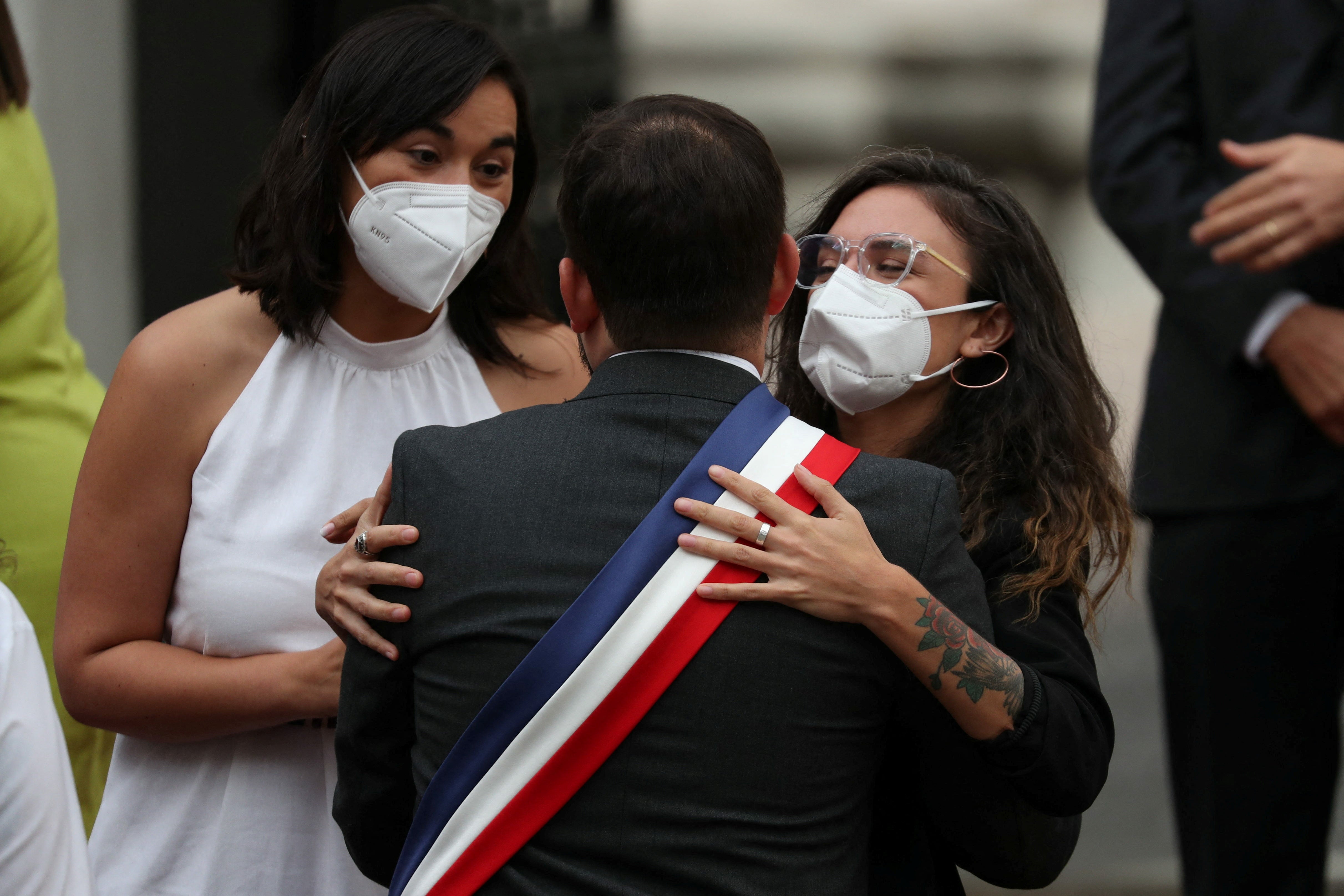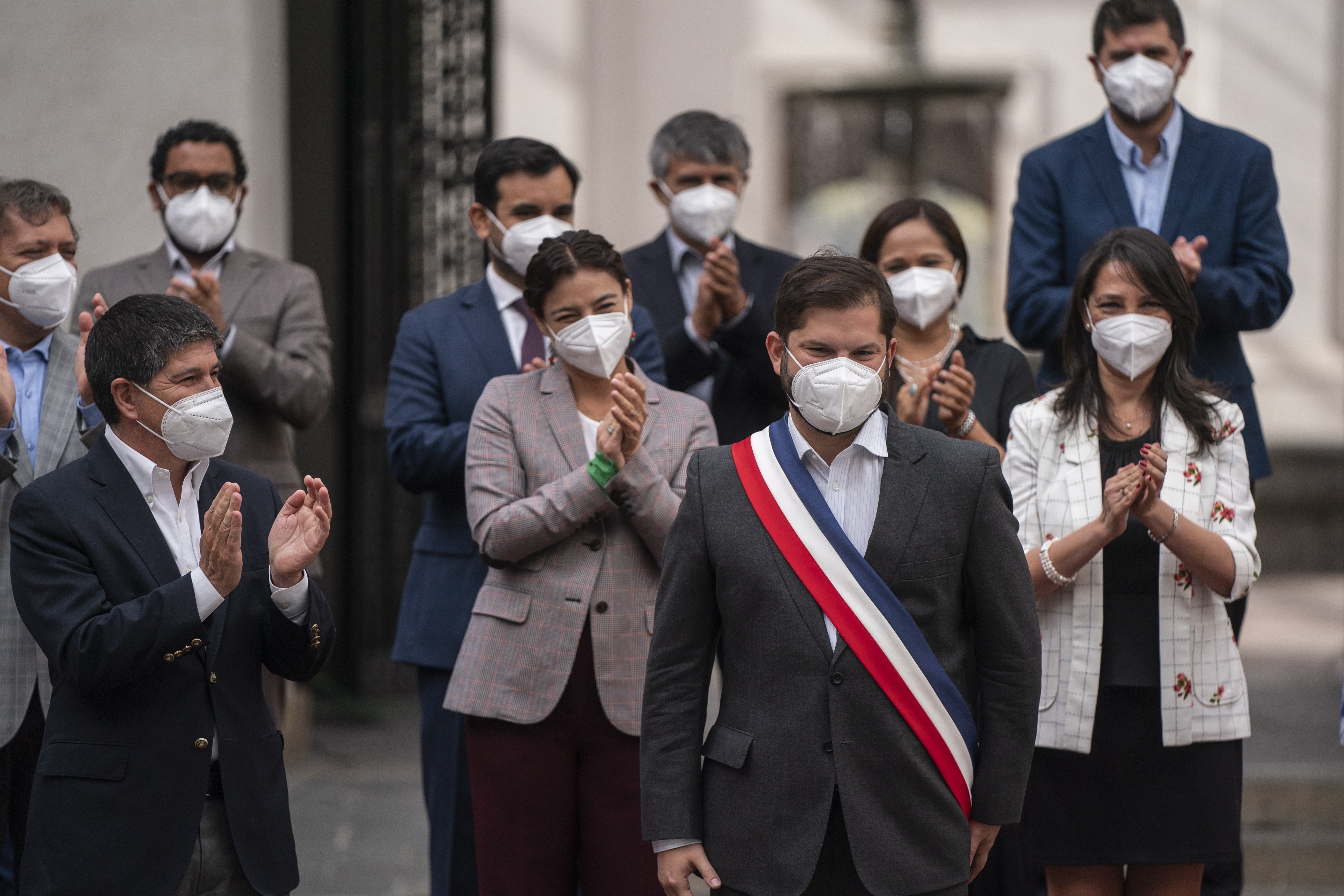Chile’s latest revolution: president Boric pledges gender equality and major change
The new government has appointed the country’s first majority female cabinet and is promising big social changes, reports James Jackson in Santiago


With the moment marked by two men passing a sash and a medal to each other, it might look like a traditional handover of power, but make no mistake – this is the official inauguration of one of the world’s most feminist governments ever.
President Gabriel Boric, inaugurated on Friday, has shown his commitment to gender equality in a number of ways; with 14 women and 10 men, he has the country’s first majority female cabinet, giving women many of the powerful offices of state typically reserved for men, such as the foreign ministry and the defence ministry.
He has moved the Ministry for Women into the inner circles of government and into the president’s office at La Moneda, where he held his first speech as president and addressed the assembled crowd first as “women of Chile”.
Considering Chile’s first post-dictatorship cabinet was all men, this is one sign of the massive changes the country has undergone since General Pinochet was removed from power in a referendum in 1990.
“What is remarkable is that these changes are all because of social pressure coming from below,” says Dr Claudia Heiss, head of political science at the University of Chile.
Until 2019 only 15 per cent of Chilean representatives in congress were women, and former president Michelle Bachelet, Latin America’s first elected female leader, struggled to improve the position of women due to social and political intransigence, adds Dr Heiss.
Described by the poet Pablo Neruda as “a long petal along the sea”, Chile is 4,000 miles long, stretching from the driest desert on earth to the Antarctic, with scores of different landscapes and cultures in between.
Initially colonised by the Spanish, there are influences from other European nations too, with German-style beer and küchen (cake) in the south and the traditional English customs of afternoon tea alongside indigenous groups like the Mapuche and Aymara. It was to this melting pot that Gabriel Boric’s Croatian ancestors arrived in Chilean Patagonia.
The bearded young left-winger has a struggle ahead of him to unite such a disparate country after historic tumult, as even his closest allies admit.
Chile is currently in not one but two states of emergency left by the outgoing government – a violent conflict with Mapuche groups in the south and thousands of mostly Venezuelan immigrants crossing the border in the north.
Though praising the cooperation between Boric’s left-wing alliance and the more centrist groups he relies on in Congress, the general secretary of his party, Javiera Menay, told The Independent that solving the “economic and political crisis” left behind by the outgoing Sebastian Pinera will be the government’s top priority, followed by convincing the public to vote to approve the new constitution, the world’s first written by an equal number of men and women.
Tensions between classes, generations and ethnicities have come to a head in recent years in Chile, with the dramatic 2019 social uprising, 2020’s vote to repeal the Pinochet-era constitution and last December’s stark far-right vs left election campaign.
According to attendees of Santiago’s women’s march earlier this month, Boric has a lot of work to do.
“As well as gender parity, I would like more respect for the indigenous people and for minorities like trans people … and for the environment; Chile lives from its natural resources,” said activist Andrea Arancibia. In a country that celebrated its first gay marriage last Thursday, the pace of change is dizzying.
Many at the march were wearing pink caps emblazoned with Boric’s election logo.
This vote of confidence from protesters is not surprising; Gabriel Boric first emerged as a leader of the “penguin movement” student protests in black-and-white uniforms back in 2006. Students are still protesting today, but now chant that outgoing president Pinera is a “murderer just like Pinochet” for his violent crackdown on protesters, which killed dozens and blinded hundreds.
In a stark contrast, Boric invited a protester who lost both his eyes in 2019 to his inauguration. Members of Boric’s incoming government joined the women’s day protesters, with future ministers marching in front of a giant pink mock-up of a feminist constitution.
Marching alongside Boric’s reluctant first lady was the incoming minister for women and gender equality, the government spokesperson Camila Vallejo, and interior minister Izkia Siches, the first woman in her post.

Before quitting to run Boric’s presidential campaign, Siches was head of the College of Medicine and in charge of the country’s widely-praised pandemic response, with one of the best vaccine roll-outs in the world, after the UK and Israel.
Another veteran of the penguin movement, her recently-announced plans as interior minister to end the state of emergency in the Wallmapu region, where the Mapuche have historically been based, has been praised by activists.
“We have hope that they will remove all soldiers from Wallmapu,” said Rosa Gonzales from the Network of Mapuche Women.
During Boric’s presidential address the largest cheer was reserved for when he said: “It’s not ‘the Mapuche conflict’, it’s a conflict between the Chilean state and a people that has a right to exist and the solution there will not be violence.”
Not all citizens agree, and Boric’s far-right electoral rival Jose Antonio Kast, who used violent rhetoric against the Mapuche, achieved his highest vote share in the region most affected by the conflict. Dr Heiss thinks that, along with immigration, this will be one of the governments biggest headaches.
“There are a lot of challenges in the Mapuche conflict, such as organised crime, that are hard to solve while maintaining the rule of law,” she says.
Boric’s decisive victory at last November’s election will help his mission to bring the country together, as may his appointing of a centre-left finance minister in a country where many remain suspicious of communism.
This suspicion is bolstered by the tens of thousands of Venezuelans who have fled to Latin America’s richest country. One of these, Jesus Zerpa, a bartender at the trendy La Resistencia bar just next to Boric’s new humble presidential residence, has mixed feelings about the incoming president: “If the change is good that’s fine but let’s see how it works in practice. I don’t think socialism works, looking at my country. But maybe a socialist president here will be different here and do a good job.”
And though Boric’s flag-waving supporters left the Plaza of the Constitution in an almost ecstatic state, reality hit quickly as fights broke out between masked hooligans throwing rocks and riot police spraying clouds of tear gas from their armoured vehicles, a sign of the trouble and tension Chile still faces.






Join our commenting forum
Join thought-provoking conversations, follow other Independent readers and see their replies
Comments